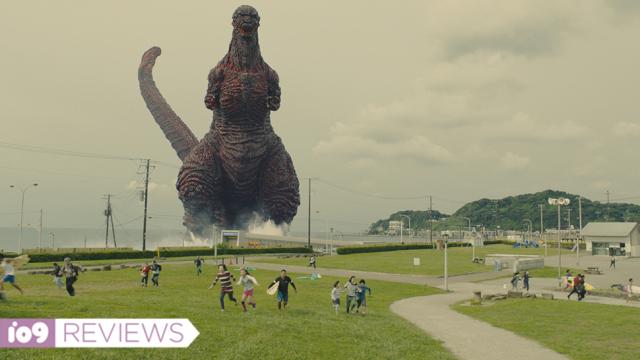The best exploitation films try. Beyond slashing up coeds or destroying major metropolitan areas or engaging in some salacious torture porn, a good exploitation flick is earnestly trying to be more. The guys who made Addio Zio Tom (1971) were trying to confront America’s sustained systemic abuse of black bodies. The people behind Rape Squad (1974) were trying to confront modern rape culture. When Toho made the original Godzilla (Gojira) in 1954 it wasn’t just a movie about a giant lizard destroying Tokyo. Gojira was about the horrors of nuclear warfare.
Shin Godzilla, the third Japanese reboot of the Godzilla franchise and the 31st Godzilla film in total (including both American ones) is an earnest, important, perfect mess of an exploitation film. This is what monster movies have been missing for the last few years. It is, of course, a movie about a monster that shoots lasers out of its scales. But it is also a jingoistic pontification on current Japanese political culture, and a really, really, really dopey satire.

That kind of makes sense when you look at the films directors. Shinji Higuchi directed last year’s so-so Attack on Titan films, but before that he worked on one of the most important giant monster allegories of the last twenty years: Neon Genesis Evangelion. His co-director for Shin Godzilla, and also the writer, didn’t just work on Evangelion. He created it. Hideaki Anno came out of semi-retirement and overcame a serious bout of depression to write and direct Shin Godzilla and you can feel his creative mania in every cell of the film — besides also enjoying some very Evangelion visuals.
The first thirty minutes are unrelenting. Godzilla’s arrival is immediate and furious and confounding — the monster doesn’t quite look like itself at first, but like a bizarre bug-eyed salamander the floods the streets with gushing waves of blood from its gills (seriously). It rushes forward with no concept of right or wrong. Laying waste to buildings full of families and leaving a smoking trail of devastation in its wake.
The first thirty minutes highlight what a neat blend of monster movie and satirical take on government bureaucracy Shin Godzilla is. As Godzilla marches toward Tokyo, the bureaucrats gather and meet and brief each other over and over again. Every question is filtered through two or three people, every room is filled with men in dark suits and, on occasion, one lone woman severe enough to weather the patriarchy.
Anno and Higuchi’s satire is as blunt as it is sincere. And that’s what makes it so good! They’re so furiously earnest with everything they’re doing and saying. The bureaucrats are all purposely wooden in their delivery, and the heroes passionate to the point of recklessness. There is no subtlety. Bad guys and good guys are determined by how electric they are in front of the camera.
They’re also determined by how much they kowtow to America. This is a film fed up with the last 71 years of Japan’s relationship with America. Post-World War II Japan was aggressively demilitarized. Japan can have no standing army. Instead, since 1954, it’s had the Japanese Self Defence force — a find of National Guard — for internal protection and dealing with natural disaster. For all external threats it relies on a treaty penned, post war, with the US.
This situation was overwhelmingly popular with the general Japanese public until only very recently. North Korea’s increased shows of force in the Sea of Japan / East Sea and Japan’s own struggles since the massive 2011 earthquake have rapidly changed the public’s opinion on anti-militarization. It’s reflected in Shin Godzilla, where there’s a very specific kind of pride in the military capabilities of the SDF. Is unusually hawkish — a major taboo since 1945.
The hero, Rando Yaguchi (played by Attack on Titan‘s Hiroki Hasegawa), scowls with every mention of the US and makes bitters asides by Japan’s relationship with the country. Worrying over the near symbiotic relationship he perceives. When the sexy US diplomat shows up (the third woman to speak and the first one with any since of fashion or fun) it’s not a friendly relationship. It’s a teasing and wary one.
The US has plans that Japan will immediately abide by. Unless lowly Deputy Chief Cabinet Secretary Rando Yaguchi can find his voice and save his people — not only from the massive monster raging through Tokyo but from the sleeping beast across the Pacific Ocean.
Less overt than Shin Godzilla‘s satirical take on Japan-US politics is its allegory about the 2011 earthquake and subsequent Fukushima nuclear plant meltdown. The directors don’t hammer in any kind of theme related to the dual disasters. Instead they borrow from the original Godzilla‘s playbook and lean on allusions to visuals. Godzilla’s arrival in Tokyo is ushered in with a surge of ocean water familiar to anyone who saw footage of the tsunami and when the big guy starts spewing radiation, accidentally irradiating one of the largest cities on the planet, there’s a shot of the radiation cloud familiar to anyone who followed the Fukushima meltdown.
The allegory of disaster is, ultimately, where Shin Godzilla struggles. While it’s a damn perfect monster movie and amusing, if over-the-top, satire, its allegory of natural disaster and nuclear devastation is weak and muddled. It lacks the beautiful simplicity of the original Godzilla. Godzilla is often just a giant monster (with a fantastic design) there to fuck shit up in big entertaining set pieces.
But those set pieces are so much fun that the film can be forgiven its muddy allegories and hawkish politics. Enthusiasm goes an incredibly long way in a monster flick, and Shin Godzilla has enthusiasm in spades. If every monster movie were as earnest as Shin Godzilla than trips to the theatre would be a helluva lot more fun.
